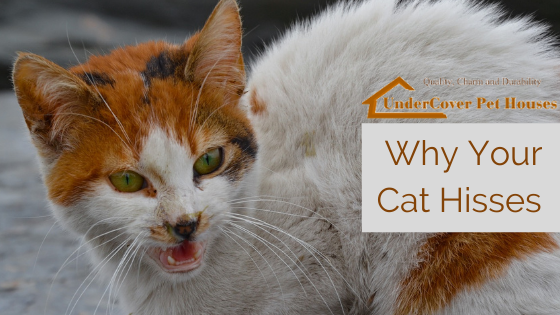 Loading... Please wait...
Loading... Please wait...Blog - cat hissing
Cat Hissing: Everything You Need To Know
Posted by Danny MacDonald on 2021 Dec 12th

Have you ever asked why your cat hisses or what it means when your cat hisses? If so, you’re not alone. Although cats have been household pets for thousands of years, their communication skills remain somewhat of a mystery to us mere humans.
Thankfully, understanding how cats communicate can help you understand why your cat hisses and how to interpret the hissing behavior effectively.
Here are some common reasons why your cat hisses and how you can deal with this behavior.
What is Cat Hissing?
Cat hisses are powerful sound bursts that resemble snake hisses. They are a defensive behavior that cats engage in when they feel threatened, making them force air through their mouth during exhalation.
Common Reasons Why Your Cat Hisses
To understand why cats hiss, you need to know what they are saying. Here are some common reasons why cats’ hiss.
1) To express annoyance
Many cats express their displeasure by hissing at people and other pets. This is a clear signal that your cat wants to be left alone.
2) If cornered
If your cat is cornered and thinks they have no way out, they may hiss at you as a way of trying to feel more in control of a bad situation. Giving them a way out can help diffuse an uncomfortable situation for both of you.
3) If frightened or threatened
When your cat is frightened or threatened, hissing is one of its first defense mechanisms. A hiss may make the aggressor think twice about approaching. A nervous cat will also likely arch its back, puff up its fur and show off its claws as well.
4) Unfamiliar spaces, pets or, people
Environmental changes cause a lot of stress and discomfort to cats. Many cats hate being in unfamiliar spaces or around new people or pets as they don’t feel safe.
5) Confrontation
Cats will often hiss during a confrontation with other animals. Think of it as their way of saying, I’m ready to rumble if you don’t keep your distance.
6) Pain
Cats sometimes growl and hiss when someone tries to pet or touch them in areas they’re experiencing physical pain. Pay attention and try to figure out if this behavior is repetitive. If so, seek immediate vet assistance.
7) To prepare for a fight
Cats hiss as a warning before they begin combat. Sometimes, they may even attack if they feel threatened enough to protect themselves from danger.
8) Stress
Cat stress can also be the reason behind your cat’s hisses. However, it can be hard to tell whether your cat is hissing out of stress or other causes, so it’s best to pay attention to their body language and facial expressions as well as their behavior.
9) Protecting their young
Nursing cats are known to instinctively hiss if someone comes too close to their kittens. Nursing cats should be given space to tend to their litter with minimal interference.
How to Get Your Cat to Stop Hissing
- Stand down
Hissing is a warning that tells other animals—and humans—to back off. In most cases, hissing indicates irritation and potential aggression.
The intensity of a cat’s hiss correlates with its level of agitation, so if your cat starts hissing, you should stand down either and try to calm down the situation by giving your cat their space. What’s more, avoid verbal and physical engagement such as pushing, shouting, etc.
- Avoid the stressors
Find out what’s upsetting your cat and get rid of it before the hissing escalates. Be vigilant of your cat’s body and act accordingly. Make sure there are no dangers for them around your home.
Additionally, teach your children and visitors about how to pet and treat a cat. New pets should have proper introductions.
- Provide stress outlets
Ensure your cat has plenty of outlets or hiding places where they can relax and get rid of bad energy such as scratching posts, outdoor houses, etc.
Bottom line
Hissing can be pretty alarming, primarily if you’ve never heard your cat do it before. However, hissing is a normal part of your cat’s communication. Always remain calm and try to understand and resolve the reason behind your cat’s hisses. If the hissing continues, remember to contact your vet.
